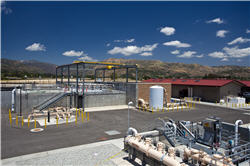The recent completion of a $52 million project to rid Roxana Marsh of contaminated sediment will speed the recovery of Indiana’s Grand Calumet River, marking a step forward for one of the Great Lakes’ most complex Area of Concern cleanups.
New groundbreaking research by scientists at Trinity College Dublin has found that exposure to nanoparticles can have a serious impact on health, linking it to rheumatoid arthritis and the development of other serious autoimmune diseases.

Nearly everyone can recall being told to conserve water at some point in our lives…turn off the faucet while brushing your teeth, run the shower only just before entering, don’t wash the car during particularly dry summers. We viewed these directives as minor inconveniences -- the idea of communities experiencing serious water shortages was reserved for developing nations.
The oceans have warmed in the past 50 years, but not by natural events alone. New research shows that the observed ocean warming over the last 50 years is consistent with climate models only if the models include the impacts of observed increases in greenhouse gas during the 20th century.
Vast stores of carbon in U.S. forest soils could be released by rising global temperatures, according to a study by UC Irvine and other researchers in today's online Proceedings of the National Academy of Sciences in Washington, D.C.
Chemical reactions on the surface of metal oxidesare important for applications such as solar cells that convert the sun's energy to electricity. Now scientists have found that a previously unappreciated aspect of those reactions could be key in developing more efficient energy systems.
The EPA said it will approve revisions submitted by the Texas Commission on Environmental Quality to the state’s permitting program for major air pollution sources under the Clean Air Act’s New Source Review (NSR) program.
As landfills overflow with discarded plastics, scientists have been working to produce a biodegradable alternative that will reduce pollution. Now a Tel Aviv University researcher is making environmentally friendly plastics tougher than ever before.
University of Tennessee researchers have successfully developed a key technology in developing an experimental reactor that can demonstrate the feasibility of fusion energy for the power grid.
A commentary published today in GCB Bioenergy reveals that calculations of greenhouse gas (GHGs) emissions from bioenergy production are neglecting crucial information that has led to the overestimation of the benefits of biofuels compared to fossil fuels.
Leading environmental services company Republic Services, Inc., FORTISTAR and Duke Energy dedicated a new, state-of-the-art, landfill gas-to-energy plant in North Carolina with a ribbon-cutting event at the site today.
An EPA direct final rule published June 8 amends its heavy-duty diesel regulations so engine manufacturers may deploy emission controls or settings to be used only in emergency vehicles such as ambulances and fire trucks.
In the journal Nature, paleoclimate researchers reveal that about 12-5 million years ago climate was decoupled from atmospheric carbon dioxide concentrations. In the last five million years, changes in ocean circulation allowed Earth's climate to become more closely coupled to changes in carbon dioxide concentrations in the atmosphere.
Communities of microbial organisms -- species such as nematodes, protists and fungi -- on beaches along the Gulf of Mexico changed significantly following the Deepwater Horizon oil spill in April 2010, research from the University of New Hampshire’s Hubbard Center for Genome Studies (HCGS) and partners found.
CAS DataLoggers recently provided the data-logging solution for an environmental organization monitoring an outbreak of algal blooms in a major river.
The U.S. Environmental Protection Agency (EPA), the National Institute of Environmental Health Sciences (NIEHS) and the Department of Health and Human Services (HHS) Office of the Coordinator for Health Information Technology have announced a nationwide challenge called My Air, My Health (MAMH).
Twenty years after the Earth Summit in Rio de Janeiro, 17 prominent ecologists are calling for renewed international efforts to curb the loss of biological diversity, which is compromising nature's ability to provide goods and services essential for human well-being.
A group of scientists from around the world is warning that population growth, widespread destruction of natural ecosystems, and climate change may be driving Earth toward an irreversible change in the biosphere, a planet-wide tipping point that would have destructive consequences absent adequate preparation and mitigation.
The dramatic meltoff of Arctic sea ice due to climate change is hitting closer to home than millions of Americans might think.
The cities that are most active in preparing for climate change are not necessarily the biggest or wealthiest. Indeed, as an MIT survey released today shows, 95 percent of major cities in Latin America are planning for climate change, compared to only 59 percent of such cities in the United States.